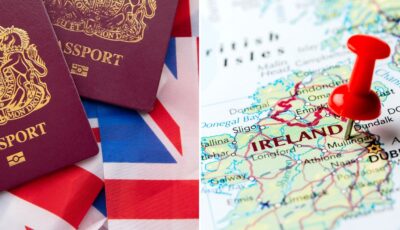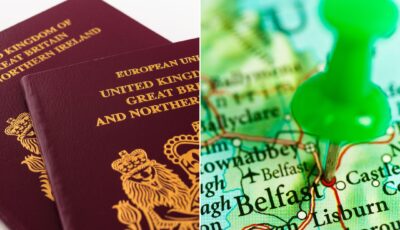Let me warn you right away: Ireland is not a destination where you can bask in the sun.
The weather in Ireland can be quite unpredictable, depending on the time of year.
Its temperate, oceanic climate makes it above all a country with a humid, often rainy and changeable climate.
From insignificant drizzle to heavy rain, the Irish climate is a veritable anthology of climatic phenomena.
You'll also enjoy pleasant moments of sunshine, fabulous rainbows (very common in Ireland), thick fogs and fabulous downpours that permeate the Irish soil.
Don't forget your umbrella: you'll need it fast!
The four seasons in a single day
A rainy and changeable climate
[caption id="attachment_76626" align="alignright" width="400"]

The Classiebawn castle - © Bruno Biancardi[/caption]
An Irish proverb claims that you can have all 4 seasons of the year in a single day in Ireland!
So don't be fooled into going out on a good morning without the bare essentials: an early morning sun may well herald a rainy afternoon!
(An umbrella or a good windbreaker will prevent any unpleasant surprises).
Don't be fooled: Ireland may be a wet and rainy country, but it's also blessed with rather mild temperatures.
Although we're a long way from the heat of summer, temperatures range from 0°C to a maximum of 25°C in both winter and summer.
And it's worth knowing that a 25°C temperature in Ireland can sometimes feel much hotter than elsewhere!
So, if you're going on a trip to Ireland, don't hesitate to take a complete suitcase with you, containing both warm clothes and lighter ones.
In Ireland, we apply the "onion technique", removing layers of clothing when necessary!
It's easier to uncover than to cover up when clothes are in short supply!
In fact, there's almost no difference in temperature depending on where you are: Ireland has a fairly uniform climate.
Note that it snows more and more regularly in winter on the island.
Most areas are affected: cities and countryside alike.
It can even happen that some remote roads are cut off due to a lack of snow-clearing infrastructure.
Know the Irish climate... and avoid its pitfalls
1. Regularly ask Met Eireann, the local weather service
[caption id="attachment_50290" align="alignright" width="400"]

A rainy day in Ireland - Lucy Fisher - cc[/caption]
Of course, it's not always easy to find your way around a changing climate.
But Ireland's weather specialist, known as "Met Eireann", is pretty reliable.
So it can predict hour by hour how the weather will evolve, based on a precise geographical area.
To follow their forecasts, we recommend you download their smartphone application.
Available on Android and Apple Store, this app called "Met Eireann", will let you query their daily database, depending on where you are.
Their website is also a good alternative for consulting their information.
Finally, of course, there are other meteorological services.
It's up to you to choose the one that's right for you and to check its reliability index.
The use of such a service will allow you to organize your day's program without worry (museum in bad weather, and outdoor exploration in good weather!)!
2. Come out covered, and apply the onion technique!
[caption id="attachment_77146" align="alignright" width="400"]

Torc Mountain - © gabriel12[/caption]
In Ireland, it's best to cover up well, and remove layers of clothing if the climate allows.
This is known as the "onion technique"!
We also recommend that you take along everything you need to survive the cold and rain: sweater, windbreaker, hood...
There's nothing to stop you removing it layer by layer, so you can enjoy a nice ray of sunshine!
(because beware, the sun can beat down hard in Ireland!)
In summer, the climate is generally more stable: the Irish even experience heat waves that are stifling to say the least.
So pack clothes suitable for all seasons: this will prevent you from being stuck with unsuitable clothes when you get there!
3. Avoid high-risk areas in bad weather
[caption id="attachment_65059" align="alignright" width="400"]

The Cliffs of Moher in a storm[/caption]
Climate change continues to affect Ireland.
That's why green Erin is regularly battered by impressive storms.
When winds are strong, and rainfall heavy, certain areas of the Irish coastline can be particularly dangerous.
There is a risk of "wave submersion", where the ocean can literally invade the Irish coastline, particularly around local ports and beaches.
So, for your own safety, we advise you to visit the coast only in normal weather (storms don't happen every week in Ireland, so you should be safe if you choose your period well!).
Granted, the spectacle of the raging ocean is magnificent, but it can present a real danger to everyone.
To be avoided.




 The Classiebawn castle - © Bruno Biancardi[/caption]
An Irish proverb claims that you can have all 4 seasons of the year in a single day in Ireland!
So don't be fooled into going out on a good morning without the bare essentials: an early morning sun may well herald a rainy afternoon!
(An umbrella or a good windbreaker will prevent any unpleasant surprises).
Don't be fooled: Ireland may be a wet and rainy country, but it's also blessed with rather mild temperatures.
Although we're a long way from the heat of summer, temperatures range from 0°C to a maximum of 25°C in both winter and summer.
And it's worth knowing that a 25°C temperature in Ireland can sometimes feel much hotter than elsewhere!
So, if you're going on a trip to Ireland, don't hesitate to take a complete suitcase with you, containing both warm clothes and lighter ones.
In Ireland, we apply the "onion technique", removing layers of clothing when necessary!
It's easier to uncover than to cover up when clothes are in short supply!
In fact, there's almost no difference in temperature depending on where you are: Ireland has a fairly uniform climate.
Note that it snows more and more regularly in winter on the island.
Most areas are affected: cities and countryside alike.
It can even happen that some remote roads are cut off due to a lack of snow-clearing infrastructure.
The Classiebawn castle - © Bruno Biancardi[/caption]
An Irish proverb claims that you can have all 4 seasons of the year in a single day in Ireland!
So don't be fooled into going out on a good morning without the bare essentials: an early morning sun may well herald a rainy afternoon!
(An umbrella or a good windbreaker will prevent any unpleasant surprises).
Don't be fooled: Ireland may be a wet and rainy country, but it's also blessed with rather mild temperatures.
Although we're a long way from the heat of summer, temperatures range from 0°C to a maximum of 25°C in both winter and summer.
And it's worth knowing that a 25°C temperature in Ireland can sometimes feel much hotter than elsewhere!
So, if you're going on a trip to Ireland, don't hesitate to take a complete suitcase with you, containing both warm clothes and lighter ones.
In Ireland, we apply the "onion technique", removing layers of clothing when necessary!
It's easier to uncover than to cover up when clothes are in short supply!
In fact, there's almost no difference in temperature depending on where you are: Ireland has a fairly uniform climate.
Note that it snows more and more regularly in winter on the island.
Most areas are affected: cities and countryside alike.
It can even happen that some remote roads are cut off due to a lack of snow-clearing infrastructure.
 A rainy day in Ireland - Lucy Fisher - cc[/caption]
Of course, it's not always easy to find your way around a changing climate.
But Ireland's weather specialist, known as "Met Eireann", is pretty reliable.
So it can predict hour by hour how the weather will evolve, based on a precise geographical area.
To follow their forecasts, we recommend you download their smartphone application.
Available on Android and Apple Store, this app called "Met Eireann", will let you query their daily database, depending on where you are.
Their website is also a good alternative for consulting their information.
Finally, of course, there are other meteorological services.
It's up to you to choose the one that's right for you and to check its reliability index.
The use of such a service will allow you to organize your day's program without worry (museum in bad weather, and outdoor exploration in good weather!)!
A rainy day in Ireland - Lucy Fisher - cc[/caption]
Of course, it's not always easy to find your way around a changing climate.
But Ireland's weather specialist, known as "Met Eireann", is pretty reliable.
So it can predict hour by hour how the weather will evolve, based on a precise geographical area.
To follow their forecasts, we recommend you download their smartphone application.
Available on Android and Apple Store, this app called "Met Eireann", will let you query their daily database, depending on where you are.
Their website is also a good alternative for consulting their information.
Finally, of course, there are other meteorological services.
It's up to you to choose the one that's right for you and to check its reliability index.
The use of such a service will allow you to organize your day's program without worry (museum in bad weather, and outdoor exploration in good weather!)!
 Torc Mountain - © gabriel12[/caption]
In Ireland, it's best to cover up well, and remove layers of clothing if the climate allows.
This is known as the "onion technique"!
We also recommend that you take along everything you need to survive the cold and rain: sweater, windbreaker, hood...
There's nothing to stop you removing it layer by layer, so you can enjoy a nice ray of sunshine!
(because beware, the sun can beat down hard in Ireland!)
In summer, the climate is generally more stable: the Irish even experience heat waves that are stifling to say the least.
So pack clothes suitable for all seasons: this will prevent you from being stuck with unsuitable clothes when you get there!
Torc Mountain - © gabriel12[/caption]
In Ireland, it's best to cover up well, and remove layers of clothing if the climate allows.
This is known as the "onion technique"!
We also recommend that you take along everything you need to survive the cold and rain: sweater, windbreaker, hood...
There's nothing to stop you removing it layer by layer, so you can enjoy a nice ray of sunshine!
(because beware, the sun can beat down hard in Ireland!)
In summer, the climate is generally more stable: the Irish even experience heat waves that are stifling to say the least.
So pack clothes suitable for all seasons: this will prevent you from being stuck with unsuitable clothes when you get there!
 The Cliffs of Moher in a storm[/caption]
Climate change continues to affect Ireland.
That's why green Erin is regularly battered by impressive storms.
When winds are strong, and rainfall heavy, certain areas of the Irish coastline can be particularly dangerous.
There is a risk of "wave submersion", where the ocean can literally invade the Irish coastline, particularly around local ports and beaches.
So, for your own safety, we advise you to visit the coast only in normal weather (storms don't happen every week in Ireland, so you should be safe if you choose your period well!).
Granted, the spectacle of the raging ocean is magnificent, but it can present a real danger to everyone.
To be avoided.
The Cliffs of Moher in a storm[/caption]
Climate change continues to affect Ireland.
That's why green Erin is regularly battered by impressive storms.
When winds are strong, and rainfall heavy, certain areas of the Irish coastline can be particularly dangerous.
There is a risk of "wave submersion", where the ocean can literally invade the Irish coastline, particularly around local ports and beaches.
So, for your own safety, we advise you to visit the coast only in normal weather (storms don't happen every week in Ireland, so you should be safe if you choose your period well!).
Granted, the spectacle of the raging ocean is magnificent, but it can present a real danger to everyone.
To be avoided.